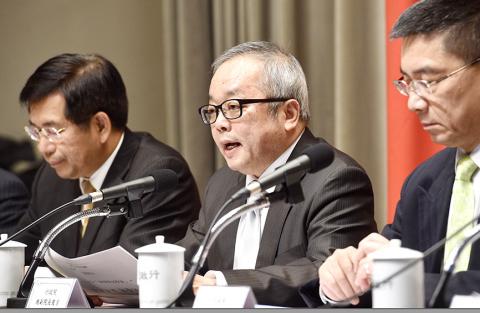The Executive Yuan yesterday proposed eight policies, dubbed the “Strengthen Taiwan Policies,” to counter the effects of 31 incentives for Taiwanese unveiled by China’s Taiwan Affairs Office.
The eight policies aim to increase benefits for researchers; lend more momentum to innovative industries; boost employee rewards and benefits; improve the work environment of medical professionals; enhance protection against corporate espionage; ramp up industrial innovation and transformation; boost the momentum of Taiwanese stocks; and deepen investment in the development of the film industry, Vice Premier Shih Jun-ji (施俊吉) told a news conference at the Executive Yuan.
The policies are to be geared toward four main goals: encouraging quality education and corporate jobs while intensifying efforts to keep talented individuals, as well as recruiting from abroad; maintaining Taiwan’s advantage in the global supply chain; promoting the expansion of the capital market; and strengthening the cultural and film industries, he said.

Photo: Peter Lo, Taipei Times.
Taiwan will become a top nation that will be attractive to talented individuals worldwide, will have a healthy economy and become strong, all based on liberty, democracy and the rule of law, he added.
China’s policies are aimed at siphoning off Taiwan’s capital and locally educated talent, which shows an evident political motive, Shih said, adding that the government must handle this issue practically and seriously.
“With a strong Taiwan, we will fear no challenge,” Shih said.
At least 15 items of the eight policies are to be implemented by the Cabinet and its various agencies this year.
To improve local stocks’ global visibility, the Cabinet said it would increase reviews for initial public offerings and cut down the review time from eight weeks to six.
Overseas subsidiaries of listed local companies would be encouraged to base themselves and list in Taiwan, the Cabinet said, adding that it would also promote the inclusion of 30 companies in an MSCI index to attract more international investment.
Measures to prevent corporate secrets from being leaked to China would include amendments to the Trade Secrets Act (營業秘密法) to establish a “retention of corporate secrets” system and punishments for related criminal activity for breaking such laws, it added.
To accelerate industrial innovation and transformation, the Cabinet said it would subsidize corporations’ purchases of “smart” machinery and software that would help them maintain a competitive edge.
It added that it would provide assistance to facilitate strategic alliances between Taiwanese industries and international corporations to further bolster the nation’s edge in the global supply chain.
Separately yesterday, Premier William Lai (賴清德) said the Cabinet would refer to China’s new policies — which Beijing has termed “incentives for Taiwan” — as simply “measures” to avoid playing along with China’s rhetoric.
As long as Taiwanese can demonstrate solidarity and bolster the nation’s economy on the foundation they have built, the nation will attract more talent and increase its global presence, Lai said.
Additional reporting by Sean Lin and Chen Mei-ying

AGING: As of last month, people aged 65 or older accounted for 20.06 percent of the total population and the number of couples who got married fell by 18,685 from 2024 Taiwan has surpassed South Korea as the country least willing to have children, with an annual crude birthrate of 4.62 per 1,000 people, Ministry of the Interior data showed yesterday. The nation was previously ranked the second-lowest country in terms of total fertility rate, or the average number of children a woman has in her lifetime. However, South Korea’s fertility rate began to recover from 2023, with total fertility rate rising from 0.72 and estimated to reach 0.82 to 0.85 by last year, and the crude birthrate projected at 6.7 per 1,000 people. Japan’s crude birthrate was projected to fall below six,

Conflict with Taiwan could leave China with “massive economic disruption, catastrophic military losses, significant social unrest, and devastating sanctions,” a US think tank said in a report released on Monday. The German Marshall Fund released a report titled If China Attacks Taiwan: The Consequences for China of “Minor Conflict” and “Major War” Scenarios. The report details the “massive” economic, military, social and international costs to China in the event of a minor conflict or major war with Taiwan, estimating that the Chinese People’s Liberation Army (PLA) could sustain losses of more than half of its active-duty ground forces, including 100,000 troops. Understanding Chinese

US President Donald Trump in an interview with the New York Times published on Thursday said that “it’s up to” Chinese President Xi Jinping (習近平) what China does on Taiwan, but that he would be “very unhappy” with a change in the “status quo.” “He [Xi] considers it to be a part of China, and that’s up to him what he’s going to be doing, but I’ve expressed to him that I would be very unhappy if he did that, and I don’t think he’ll do that. I hope he doesn’t do that,” Trump said. Trump made the comments in the context

SELF-DEFENSE: Tokyo has accelerated its spending goal and its defense minister said the nation needs to discuss whether it should develop nuclear-powered submarines China is ramping up objections to what it sees as Japan’s desire to acquire nuclear weapons, despite Tokyo’s longstanding renunciation of such arms, deepening another fissure in the two neighbors’ increasingly tense ties. In what appears to be a concerted effort, China’s foreign and defense ministries issued statements on Thursday condemning alleged remilitarism efforts by Tokyo. The remarks came as two of the country’s top think tanks jointly issued a 29-page report framing actions by “right-wing forces” in Japan as posing a “serious threat” to world peace. While that report did not define “right-wing forces,” the Chinese Ministry of Foreign Affairs was